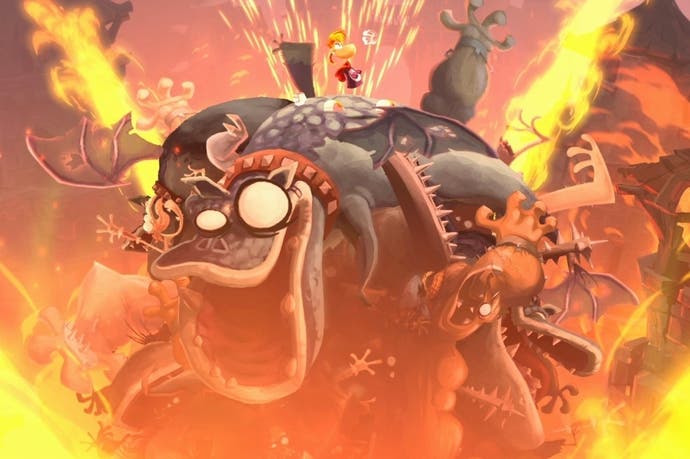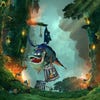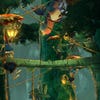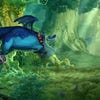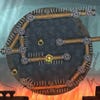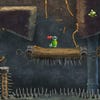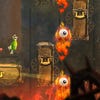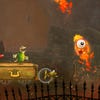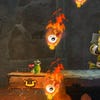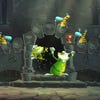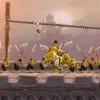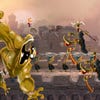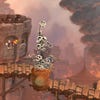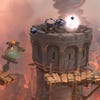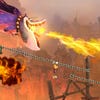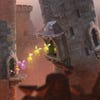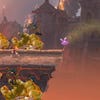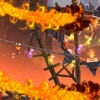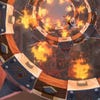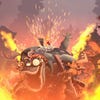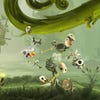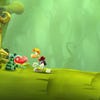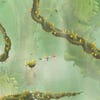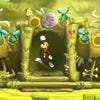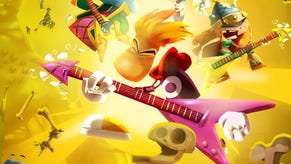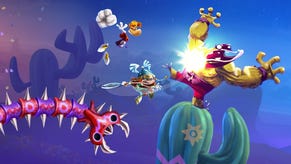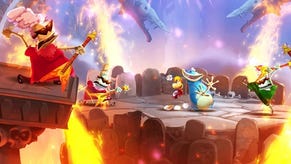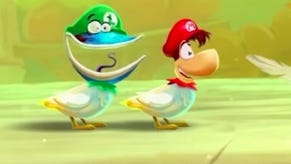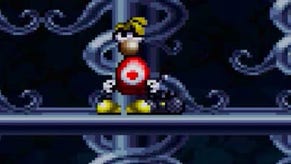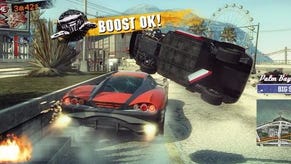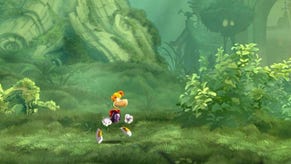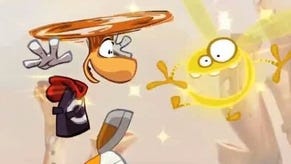The happiness of Michel Ancel, the Rayman legend
Ubisoft's jolliest studio head on the trials of Rayman and what's next for Beyond Good & Evil.
Not many interviewees will excuse themselves to go jam with the house band.
It's a warm summer evening in the south of France, and a Ubisoft PR is looking anxiously at their watch. Every other eye in the house is on the father of Rayman and Beyond Good & Evil. He's the guy sat cross-legged on stage with a pair of bongo drums in his lap.
Michel Ancel is supposed to be talking to me about the finally-complete Rayman Legends, but he's gotten a little distracted. We're at a beachfront bar in Montpellier, just down the road from his studio, for an odd mix of press junket and wrap party, and Ancel is being cheered on by a crowd of workmates who've turned up for the occasion.
I finally catch up with him a little later. He's holding a mojito and sat with Emile Morel, Rayman Legends' game director. We launch straight into a chat about the game. "You have not seen all the weapons?" Ancel jokes when I ask him something about it being a departure from Ubisoft's neck-stabbing norm. "We have knives, guns, a tank..." He laughs. It's a typical response from the man whose humour appears to permeate his work, and the outlook of the studio in general.
"The Ubisoft boss is happy that we're doing something different," he continues, on a more serious note. "Ubisoft's DNA is really connected to the roots of video games, of iconic characters. It's very interesting during meetings with the boss that there is nostalgia for this type of game."
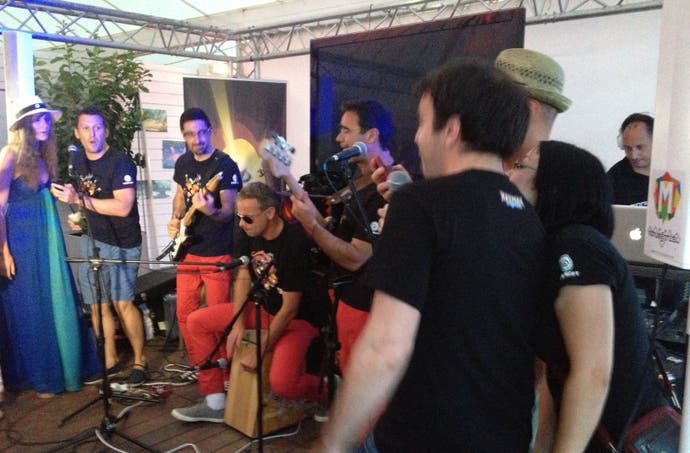
But appealing to nostalgia is not without risk. There's a reason that, plumbers aside, cheerful platformers aren't the games shifting consoles these days. Even just within Ubisoft, company mascot Rayman is somewhat overshadowed by franchise juggernauts such as Splinter Cell, Assassin's Creed and the upcoming Watch Dogs.
"Legends is a risk," Ancel admits. "When you look at people's everyday lives they're used to eating the same thing - burger, pizza, some other dish. But they're not used to trying new things. Video games are a bit like this. People only play so much, they want to play with others and play the same thing as others." He pauses. "I don't see this as good or bad - it is the tradition, and we're continuing a tradition too. With Rayman we're taking a risk, but at Ubisoft the boss wants us to take risks, experience new visuals, music and gameplay. That's why we began on Wii U, because it was an area of experimentation."
Ancel often refers to "the boss" - Ubisoft CEO Yves Guillemot - in a way that almost ignores the fact he is a boss himself. He's happy to clown around on stage with other members of his team and seems very much their colleague rather than their superior. It chimes with something else I notice while talking with him - he has something of an independent streak. He's willing to admit his initial frustration at Legends' delay and, in an anecdote shared with the whole audience, his exasperation at one particular meeting where he was being encouraged to focus more on social features.
"The boss said 'do something social! Everything has to be social!' So we put in a musical level with the song Antisocial to show to the boss," Ancel grins. "We did completely the opposite of what we were asked to." It's clear from his tone there was no malice intended, or any axe to grind in sharing the story. Talking with Ancel it's clear he's just relaxed in explaining how he feels.
Another example of this was his perhaps ill-advised decision to be photographed with a pair of intrepid fans who journeyed to Montpellier protesting Rayman Legends' delay. Ancel grins sheepishly at the event's mention. "Oh, those people," he smiles, before launching unprompted into the tale.
"That morning I arrived at 10, I think because of some party [the night before]. There were two fans like this," he pauses, miming holding the infamous 'Save Rayman' placard. "They said, 'hey Michel! Come take a picture with us!'" The photos quickly appeared online and raised eyebrows within Ubisoft itself - the initial reaction being that he and his studio were the ones protesting the company's decision.
"When you look at people's everyday lives they're used to eating the same thing - burger, pizza, some other dish. But they're not used to trying new things. Video games are a bit like this. People only play so much, they want to play with others and play the same thing as others."
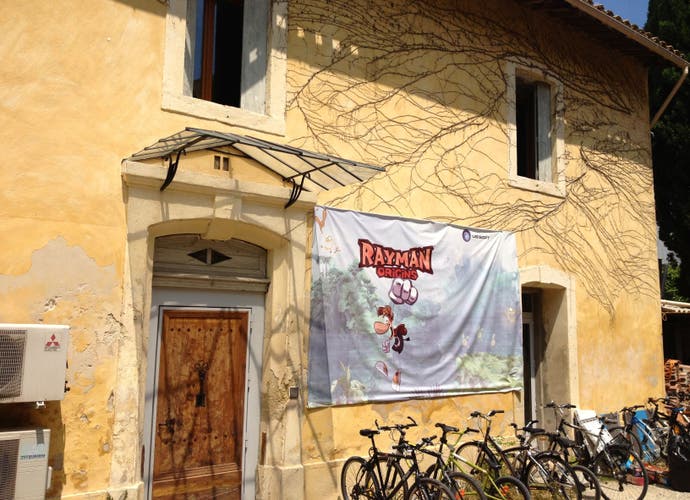
Ancel laughs again. "I felt a bit like it was a trap, which is why in the picture I'm like, 'hmm... what is this?'" He mimics his puzzled face in the photo. "I was wondering if they would use the photo privately, and it turns out no, they released it in public." He sighs. "It was like... they were nice people but I wondered if they just wanted to be famous. That's why I wasn't like 'fight! fight! fight!'" Ancel mimes shaking his fist. "We weren't used to that, that's the first time anyone has turned up here."
A second photo was taken with Ancel's co-workers, but it wasn't until after the visitors had left that anyone in the studio asked if they'd been told to keep the pictures private. "After they left we realised 'have we asked them not to put the picture on Facebook?'" Emile chuckles. "And we were like, 'um, no'."
"It was all for fun," Ancel concludes. "It wasn't like, 'This is a revolution, man! This is video games! This is very important!'" It definitely wasn't him staging his own defiant protest. "No," he tells me, smiling. "No. But it was a lot of fun."
Not many interviewees will excuse themselves to go jam with the house band - but, when he is sitting down to talk, few will be as refreshingly honest, either.
***
I've spent the day being surprised by Ancel and his studio. You can drive right past the latter and not even know it was there.
During our taxi driver's second attempt down the same road we pull up outside a modest Mediterranean-style building. Its sun-bleached walls are hastily patched and plastered, and from the outside it looks no different to any other house on the avenue. "This is it," the driver announces. He glances at his GPS again to make sure, and then waves vaguely at the residential street surrounding us.
I step from the pavement into a small garden populated with plastic furniture and a few picnic benches. A few people outside eating lunch look up as we approach. Nearby, a couple of dozen bikes lie propped on racks by a heavy wooden front door, out of which someone steps wearing a Jade from Beyond Good and Evil t-shirt. This is definitely the Villa, then - Ancel's studio, and his team's workplace since the beginning of that project.
Ancel and the other founding members moved into the Villa after enjoying the inner city feel of their previous working space, an old apartment in the city's historic centre. "We did Rayman 2 there," Ancel recalls. "There was music out in the street, tourists. It was like working in the middle of the world. We wanted to keep that feeling of being connected and we found - after a year of searching - this incredible place."
Fitting its unexceptional exterior, the Villa feels suitably low-key inside, too. Its main office space is open and airy, its inhabitants working quietly and chatting over IM. Ubisoft posters and standees lie dotted around, while desks are untidy with console dev kits and controllers. We walk through to another area. "This is the room where Michel designed Rabbids," my guide mentions as we breeze through.
A winding wooden staircase leads upwards to other rooms, past filing cabinets balancing Baftas and walls decorated by Rayman production art. Inside one side area - perhaps a bedroom in the building's previous life - I'm given a sneak peek at the team's home-made UbiArt engine, designed for Rayman Origins and perfected for Legends. It's an impressively easy-to-use development suite that makes creating production-level Rayman levels look as simple as knocking something together in LittleBigPlanet.
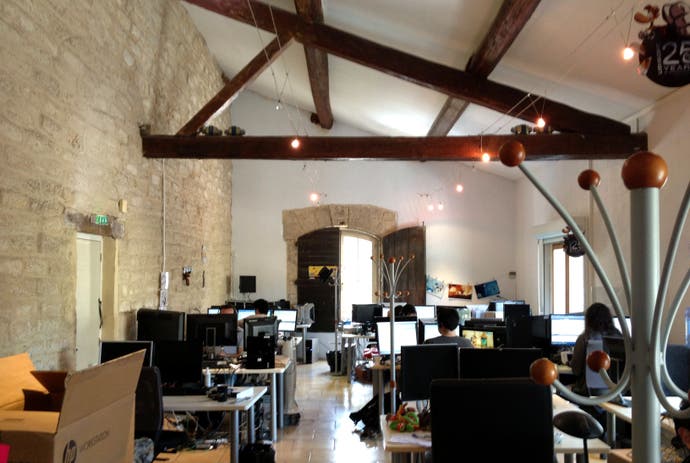
Finding such a well-known arm of Ubisoft working out of such a small, understated environment feels a little odd. Ubisoft makes enormous projects such as Assassin's Creed and Watch Dogs - the two of which alone are currently keeping nearly a dozen studios busy. The Villa is something of a black sheep in the family. Its projects are of a much smaller-scale, but I'm beginning to wonder whether any of those other studios hold the same persona. None are led by such a well-known figure, save perhaps for Assassin's Creed co-creator Jade Raymond's new Toronto studio, set up recently with her installed as its leader and public face.
Even the twin studio role of the larger Ubisoft Montpellier brand is not widely known - Ancel's Villa has a larger brother, a bulky concrete and glass office on the edge of town. The team that work there developed ZombiU, although Ubisoft generally makes no distinction between it and Ancel's staff. Contact between the two is cordial but not close - key people meet up every month to compare notes, but the teams are completely independent.
***
Ancel sips his mojito. Rayman Legends has been a longer-than-expected project, but he's currently recalling a far lengthier journey. His Rayman 2 team moved into the Villa when it was still a work-in-progress, which meant they witnessed the building's growth as a workplace while they themselves assembled a core team. "It looked very rough, with earth floors, no electricity," Ancel remembers. Early plans for the place had to be changed as more people were hired. "We thought we would be just 13 but we ended Beyond Good and Evil being 80 people, it was crazy, we thought we would explode."
It was a similar story for Rayman Origins. The project started with six people but grew to nearly 100, the majority of whom remained to work on Legends. "The good thing is that most people stayed connected," Ancel says. "We had a good core team and a good core spirit. At the end of Origins many people wanted to stay on and begin a new adventure. We were very happy to start work. It was natural that new people joined too - it's a team that's very open to new people and new ideas. But I'm very happy with those two games because even now people want to continue working together.
"We had a lot of problems in development - technical issues, commercial issues - and these people still want to make games together," Ancel chuckles. He's said previously that one of the few things which made Legends' delay palatable was the fact his team decided to stick together and work with each other for another six months when given the chance to polish the game further.
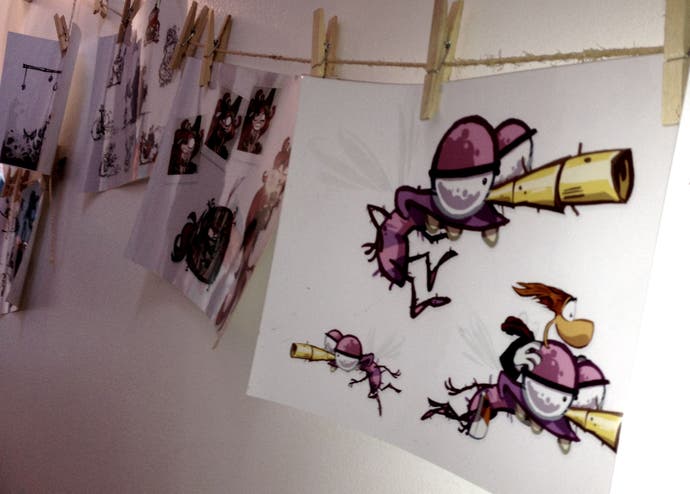
"I think we're very proud of the game," Morel chips in. "People are very willing to keep on working together. I don't know about you Michel..." Ancel shrugs, feigning indifference. "Oh, maybe you don't want to work with us anymore?"
Ancel is back in performance mode. "Leave me alone!" he pleads, as Morel and others nearby laugh. "I'm going to make my own game alone! One game to rule them all!"
Their repartee continues when I mention Beyond Good & Evil 2, a sequel that the Villa worked on for over a year before it was put on hold. I know they won't be able to answer but have to ask anyway - when will the team return to the project?
Ancel turns to Morel. "Well, what do you want to do tomorrow?" he asks smiling. "Tomorrow? Well, I don't know..." Morel replies. "Tomorrow it could be that," Ancel says, my heart skipping a beat. "Or," he pauses, "it could be another Rayman." I think I see his eye twinkle in the sunset. "There are so many possibilities..."
***
Ancel has wandered off again, excusing himself this time to check on some aspect of the event's sound system. In the meantime, I ask Morel more about life at the studio. It certainly feels like the team's willingness to remain together is at least partly a product of Ancel and the Villa's welcoming attitudes, and the relaxed nature of the location itself.
"On Friday we gather the teams - not for specific events, but having that house and the garden - it's really easy to get people together to have some drinks and hang out," Morel explains. "It may sound stupid but sometimes you're working on a game and you don't know what the quality will be. You know at the Villa that people will push to make the best game possible. This is really important for the team's spirit, to know that everyone is headed in the same direction."
Morel and I talk a little more about the game's engine - seeing levels slot together in a few clicks has stuck in my mind from earlier - and when Ancel finally materialises again, now with a fresh drink in hand, I ask him more about it.
"The key is the tools you make and the connections you keep within the team," Morel explains first. "That's one of the reasons we wanted to stop work on Beyond Good and Evil 2 and work on a smaller game. It was to experience this philosophy, to make games in an easier way. Working on a game like that - it's the kind of game where you really need these kind of tools and this philosophy. And we want to continue," he teases, "by making surprising tools that help make a big game.
"It's about giving people the ability to create something just with their own energy," Ancel adds, arriving on something which I think is key to understanding his mindset, the philosophy of the Villa and, because of these things, the relationship shared between members of his team. "The tools we design are here to make everything more fluid. When a graphical artist has an idea he is able to create this by himself and show it to others - not just with a picture, but with a playable prototype.
"The thing that has not changed in video games is the way that it is changing all the time. I remember working on the Atari Jaguar, on Rayman. It was the main platform for that game, and then Sony announced the first PlayStation. Every year there is something new arriving - a new console, a new market. You have to rush to adapt."
"It's interesting because in some teams and in some games it's so heavy to modify the game or add content," he continues. "It means people are just left feeling like 'what's the point, I would need to do 10 other things before I can do my thing'. So when we started on Origins we designed UbiArt first. I don't think it's the perfect tool for every game, but for this kind of game and for this kind of process, it is made for the team."
And, whatever's next for Ancel, it seems he's very much content with his studio right now. There are no plans to expand the Villa further - doing so would mean having to dig a basement, Ancel laughs. If anything, he sees its current limited size as an advantage. "It's nice because you could imagine designing your game with this constraint. Let's say we want to make a big game," Ancel says, neatly avoiding naming anything in particular, "but not to be too much, to keep what's important."
What's important to Ancel is clear - a solid team around him, and a technical framework that will allow them to express themselves as quickly and as fully as possible. It's the best way to tackle whatever the future holds for games, he says.
"The thing that has not changed in video games is the way that it is changing all the time. I remember working on the Atari Jaguar, on Rayman. It was the main platform for that game, and then Sony announced the first PlayStation. So we had to jump to that console, and then the N64. Every year there is something new arriving - a new console, a new market. You have to rush to adapt.
"The big thing now is the socialisation of the game. I don't think it's an obligation," he says, somewhat contradicting his earlier rant at his boss, "but a natural move. If you look at the evolution of the computer, it was originally a personal computer. Each owner had their own and that was it. But then they became connected, used for communication. We need to face this sort of new situation regularly."
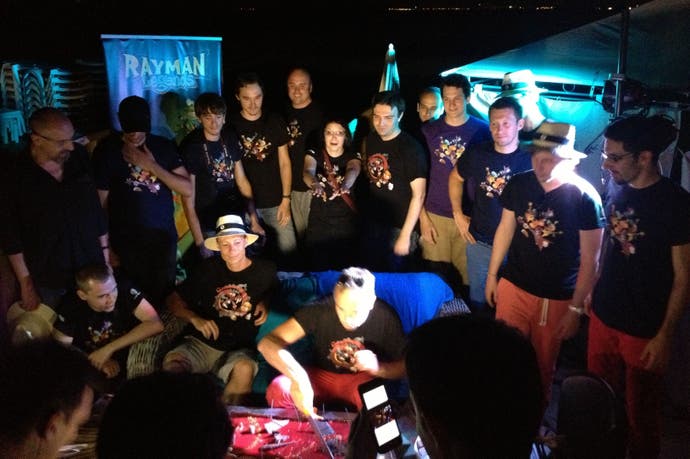
I can't help but ask him directly how he would include social aspects in Beyond Good & Evil 2, planned to be a deep, single-player game world. Ancel laughs and pauses for some time. "Unfortunately I can't say too much... but we have been mindful that it will be a real challenge for this kind of game. We want to analyse what socialisation would bring to an investigation game," he says. "That's the thing we are working on. We don't want to make it a gimmick, but something that would make the experience really interesting. But at the same time we want to stay connected to a world with its own personality.
"The balance is really about what you make as a creator and the creativity you give to players, the creativity they do with each other, the freedom you let them have and what control you keep. That's the big thing we're thinking about."
***
My interview with Ancel is drawing to an end - despite him successfully lobbying a nearby Ubisoft PR for us to speak longer due to his earlier wandering off. That's another interview first for me - as is his swatting away of a PR interruption when I ask something about the other Ubisoft Montpellier studio ("no of course you can ask this. I don't know the answer, but you can ask!").
After we finish speaking Ancel gathers his co-workers and a cake appears for him to cut. It's a sweet moment, seeing his colleagues huddle round while he does the honours. The team realise one of their number is not present and shout for him to run over so he can get in the photos too.
To me it feels like the key to life at the Villa is letting people enjoy what they're good at. It explains Ancel's brand of games development and the reason why his studio focuses so hard on enabling staff to create what they want. It makes for a better team and, arguably, a better game. So does the Villa have fun while making games, or does it make games while having fun? I'm not sure - I'm too busy watching that guy on stage, drumming along to an acoustic version of Get Lucky.
This article was based on a press trip to Ubisoft's Montpellier office. Ubisoft paid for travel and accommodation.
